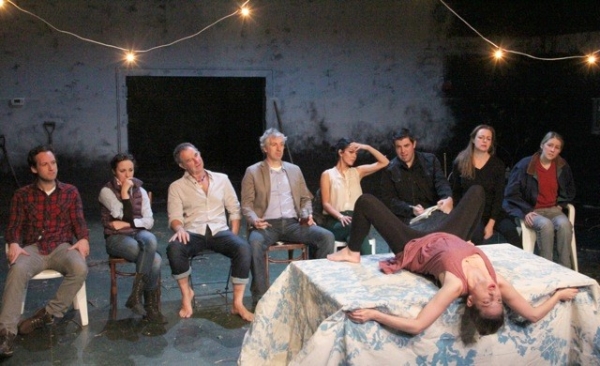The Seagull
Chekhov’s classic gets a fresh update in a new production from the Bedlam company.

(© Elizabeth Nichols)
Though Anton Chekhov's The Seagull has always struck a chord with modern audiences, it can also sometimes feel distant and austere in productions that hew faithfully to literal translations. The Bedlam Theater Company, a troupe known for innovative takes on classics such as Hamlet and Saint Joan, has given strong new wings to this play about unsatisfied love and unfulfilled dreams at the Sheen Center. Eric Tucker, one of Bedlam's founders, directs and stars in a riveting, emotionally charged production that makes this play feel more relevant — and intimate — than ever.
In Anya Reiss' new adaptation, the play's setting is still the country home of retired government worker Sorin (Stephan Wolfert), but his estate is located on the Isle of Man in the present day rather than in 19th-century Russia. Struggling writer Konstantin (Eric Tucker) has written a play to be performed for Sorin's guests, among them his mother, Irina Arkadina (Vaishnavi Sharma), a well-known actress. Konstantin's attempts at creating a new form of theater fall flat, as does his love affair with Nina (Laura Baranik), an aspiring actress who eventually spurn's Konstantin's love and becomes infatuated with Boris Trigorin (Jason O'Connell), a famous writer and Arkadina's lover. Few in this group of artists, intellectuals, and emotional misfits, including the perennially sable-clad Masha (Andrus Nichols), are destined to find happiness, especially Konstantin and Nina, whose ill-fated careers and love affairs lead them down destructive paths of madness and despair.
Bedlam's fresh take on this classic gives The Seagull's several interwoven plots new relevance. Aside from the alteration of time and place, the play's main scenes remain largely intact, such as Trigorin's ill-advised love affair with Nina, Konstantin's attempted suicide, and the shooting of a symbolic seagull. But Reiss's updated script — with its brisk dialogue and modern idiom, its inclusion of computers and cellphones, and its mention of Jeeps and Land Rovers rather than horse-drawn carriages — makes the play feel like it was written yesterday. In this version, Chekhov's genius for tapping into timeless feelings of isolation, disappointment, and rejection attains a startling immediacy. Gone are the fusty conventions of the past; these Chekhovian characters have no qualms about using occasional profanity. To modern audiences the play will likely feel more relevant than ever.
In addition to this kind of smart update to a classic text, part of what makes Bedlam productions so successful is the company's determination to get audiences close to the action and see familiar material from new perspectives. During intermission of The Seagull, everyone is asked to gather personal belongings and leave the theater. For the second half of the show, seats are placed onstage around John McDermott's simple set (a rustic table with chairs near a rickety screen door, and a large window overlooking the garden) to get everyone up close and personal for the play's most intense scenes. Combined with this intimate proximity to the action, the cast's brilliant, sometimes fiery performances give the play an added emotional intensity. Sharma's stunning Arkadina, in particular, brings tears to the eyes as she desperately begs Trigorin, in a nuanced performance by O'Connell, to stay with her.
Purists who want their Chekhov to remain a commentary on the decay of the Russian aristocracy might find this production disappointing. But for those who return to this playwright time and again to revisit his insights into human frailty and desire, Bedlam's production will send you soaring.







